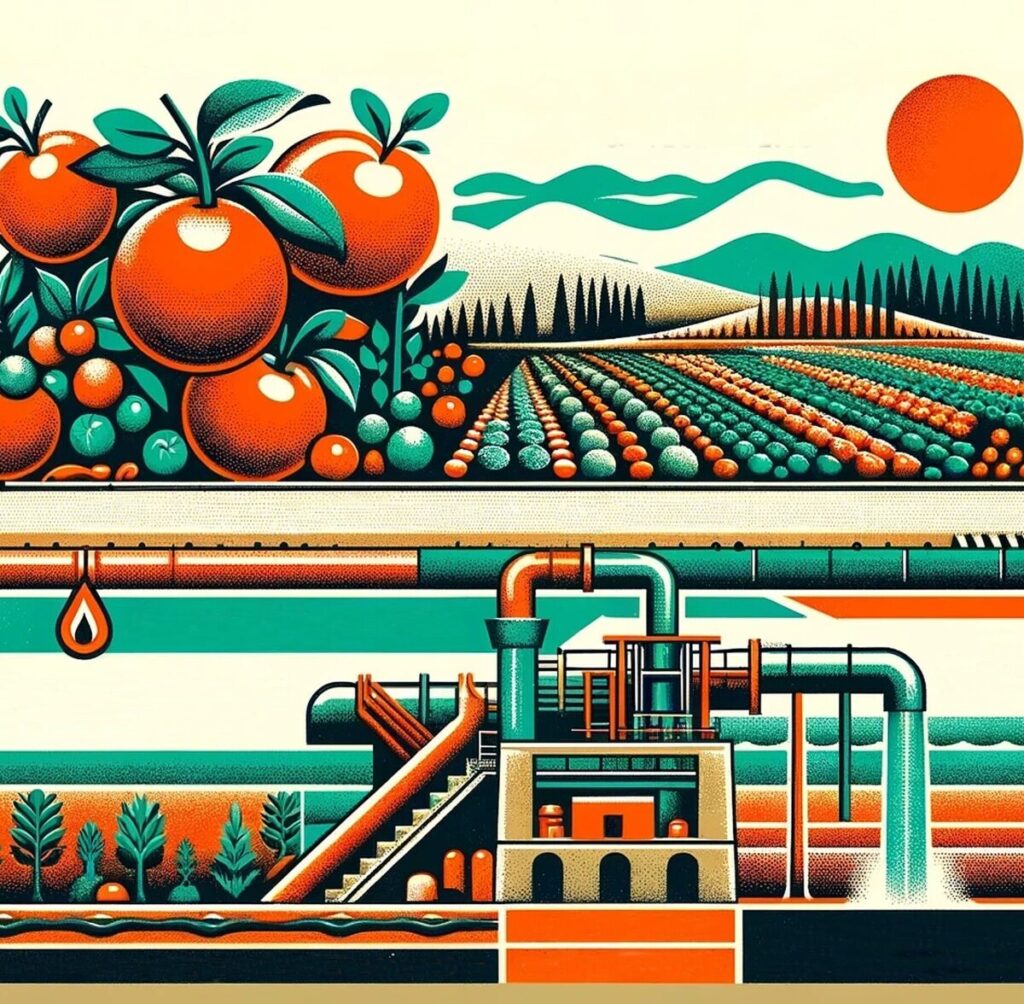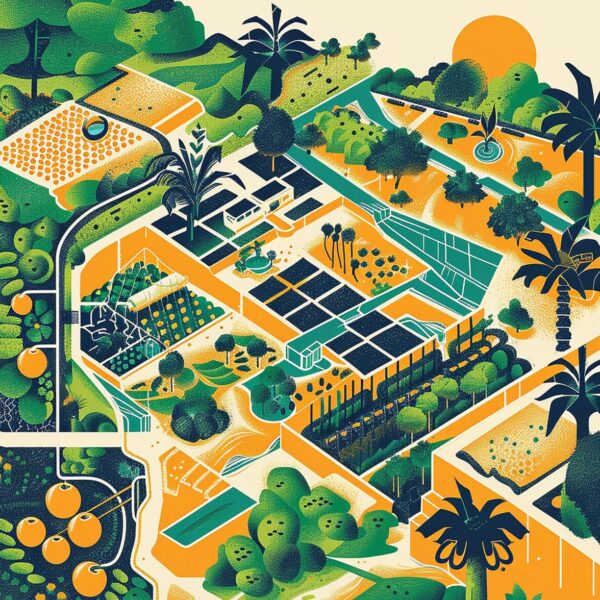Faced with climate change, countries in the South, notably Morocco, have developed practices and adapted systems in the fields of agriculture, sustainable development, and education. These include more sustainable food consumption patterns and better management of natural resources, aiming to promote a circular and resilient economy. Examples that Europe could draw inspiration from, given the accelerated "Mediterraneanization" of its climate, as explained by Abdessalam EL KHANCHOUFI to Bernard MOSSÉ.
The concept of agroecology is the same in Europe and in Morocco. For example, when French and Moroccan associations meet in this field, they discuss the same concepts, methods, and approaches.
Moroccan agriculture as a model for eco-responsible agriculture
To some extent, agroecology has always existed in Morocco, even though it was abandoned for a while due to lack of economic profitability. Today, farmers are encouraged to return to these practices because it is believed that the need for food and quality products has become a priority for urban populations. In Morocco, 40% of the population lives in rural areas. This rural world depends mainly on agriculture, which represents up to 20% of the GDP. A sector that employs nearly 40% of the active population. In 2020, when the pandemic hit, the Moroccan system worked well because there was production from the countryside. There was no shortage of fruits or vegetables in the markets because the distribution, transportation, and storage system had not reached the level of industrialization of the European system, which was disrupted by this crisis. In Morocco, farmers' markets, local markets, and the food specific to each region helped cushion the crisis. Unlike Europe, where agriculture has become a full-fledged industry linked to large-scale distribution with long transports, short circuits have become the exception. In this regard, the uniqueness of Morocco can serve as an example. Our agricultural model can easily adapt to the local economy, whereas in Europe, it must make a much greater effort to regain more environmentally friendly agricultural practices, consumption practices, and distribution practices.
In water management, there is a transfer of practices between the southern Mediterranean, which has been experiencing scarcity for centuries, and the north, which has been favored until now.
The management of this resource is regulated by customary law that sometimes dates back 70 years. It is linked to local knowledge and practices. In southern Morocco, for example, there is an underground distribution system because the temperature reaches 50 degrees. Therefore, efforts are made to keep the water protected from evaporation and solar radiation to optimize the use of this increasingly scarce resource. A network of small and large dams has been established. Some no longer supply the regions where they are built, but irrigate a vast area of territories through water highways. The goal is to transfer water from certain basins to others that are more water-deficient. In addition to these large structures, there are also associations of farmers who manage the distribution of water in the irrigated perimeters developed around medium and small dams, all over Morocco.
In Moroccan agriculture, emergence of new professions related to innovations
New professions are emerging, especially in the trade of agricultural products and local products. Platforms selling local products are gaining popularity, offering nutritious products with high added value. In addition, small-scale distribution businesses are necessary to allow small producers to sell profitably in nearby urban areas. Activities related to rural tourism, such as farm visits and tastings of seasonal local products grown according to the agroecology model, also create new opportunities for farmers. These professions have gained importance, especially with the evolution of society since the COVID-19 pandemic.
In some regions of Morocco, it has also become necessary to adapt agricultural practices due to climate change. In arid areas where water is scarce, traditional farming becomes challenging. Preserving biodiversity and adopting drought-resistant varieties are crucial. Some crops need to be abandoned, while others, better suited to water-stressed conditions, need to be promoted. Establishing a seed bank and promoting resilient local plants are important initiatives to ensure food security in the context of climate change. All these activities require making the profession of farmer attractive and profitable for young rural people. This capacity building must involve learning and short training courses provided with great flexibility by both public and private sectors.

Evolution of food consumption and production methods
In this field, we must draw inspiration from the developments observed in Europe regarding food consumption and sustainable agriculture. While Europe is reorienting its policies towards waste reduction and more responsible consumption, we must also rethink our food system. It is necessary to promote local consumption and reduce our reliance on packaging and long food supply chains. We are fortunate to have cultural and scientific exchanges with Europe, which allow us to learn from their experiences and adopt best practices for our own development. The importance of cooperation between countries in the North and the South, as well as among Southern countries themselves, is vital in the face of climate change. Around the Mediterranean, we have a lot to learn from each other in terms of agriculture, sustainable development, and education. It is essential to increase exchanges and collaborations to build a future of peace, mutual understanding, and prosperity in the Mediterranean region.
*Abdessalam EL KHANCHOUFI is a professor in environment and the director of the Continuing Education and Certification Center at the University of Fès (USMBA-Fès), Sidi Mohamed Ben Abdellah University. Former director of the National Institute of Medicinal and Aromatic Plants (INPMA), he is part of the scientific council of NEEDE for environmental transition and the board of Let’s Food, a French association dedicated to sustainable development and the food system.
**Bernard Mossé, Historian, Research, Education, and Training Manager of the NEEDE Mediterranean association. Member of the Scientific Council of the Camp des Milles Foundation - Memory and Education, for which he was the scientific manager and coordinator of the UNESCO Chair "Education for Citizenship, Human Sciences, and Convergence of Memories" (Aix-Marseille University / Camp des Milles).
The illustration of this editorial is generated by Artificial Intelligence. Among the parameters transmitted to the computer is the need for it to address the generation of 10/12-year-old children and to summarize the main points. Artistic Director of Marcelle and 22-m, Stéphan Muntaner feeds it with editorial data and guides the aesthetic dimension. Generally, about ten versions are needed before he finalizes his choice. Each illustration becomes a unique work of art and an NFT.
References
2- Kaoutar MOUNIR, haykel SELLAMI, Isabelle LA JEUNESSE, Abdessalam EL KHANCHOUFI 2023 : Assessment of Future Climate and Hydrological Changes in Semi-Arid Catchment using the SWAT Model and Bias-Corrected EURO-CORDEX Ensemble: A Case of the Ouergha catchment, North of Morocco Modeling Earth Systems and Environment, https://link.springer.com/article/10.1007/s40808-023-01775-6 ;
3- Kaoutar MOUNIR, Isabelle LA JEUNESSE, Haykel SELLAMI, Abdessalam ELKHANCHOUFI. Spatiotemporal analysis of drought occurrence in the Ouergha catchment, Morocco[J]. AIMS Environmental Science, 2023, 10(3): 398-423. doi: 10.3934/environsci.2023023 ;
4- Agri-food: A development strategy is being implemented (agrimaroc.ma)
5- Let’s Food, October 2019. The food system of Fes, Morocco. 29 minutes.
6- Let’s Food, July 2020. The territory to ensure food resilience: lessons to be learned from the COVID-19 health crisis.
7- Agrisud_Guide_Agroecology_2020.pdf (alimenterre.org)
8- Daviron B., 2020. Agriculture, Wealth, and Great Powers: A New History of Agricultural Development.
9- INRA & CIRAD, 2009. Agrimonde: agricultures and food of the world in 2050, scenarios and challenges for sustainable development.
10- Let's eat, Abdesallam El Khanchoufi. Training in agroecology for elected officials and technicians from Sefrou. https://xylm-asso.fr/formation-a-lagroecologie-pour-les-elu-e-s-et-technicien-ne-s-de-la-province-de-sefrou/
11- Yousra Abourabi. Report on the importance of adopting agroecology in Morocco. chrome-extension://efaidnbmnnnibpcajpcglclefindmkaj/https://ma.boell.org/sites/default/files/2021-05/Agroe%CC%81cologie%20MODIF%20%2823-04-2021%29.pdf
Sure! Please provide the text you would like me to translate.
